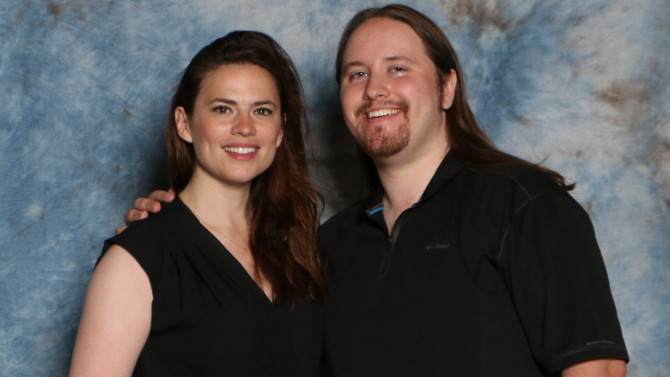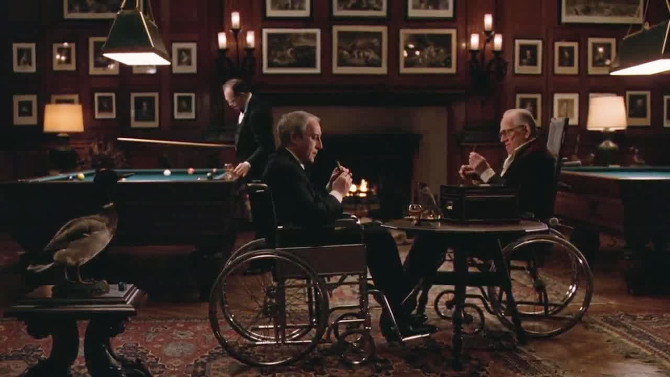Perhaps more relevant today than it was when it was released, Hal Ashby’s 1979 feature film Being There, based on Jerzy Kosinski’s 1970 novel of the same name (he also wrote the screenplay), speaks to the fickleness of fame – how, by random happenstance, one can be projected into a position of power and ‘celebrity’.
Some time back, I spoke to actress Hayley Atwell. A major player in the Marvel universe, she has starred as Peggy Carter in four films, including Captain America: The First Avenger and its 2014 sequel. This spawned the critically acclaimed series Agent Carter, which sadly got cancelled after two seasons. Currently starring on the ABC show Conviction, the British star has also appeared in excellent smaller movies like 2012’s The Sweeney and 2008’s The Duchess, as well as the entertaining mini-series The Pillars of the Earth.
When I posed my favourite question to her (i.e. her favourite film), she had two prompt responses. Speaking of her love of Bette Davis, it is fitting that one of her top films was All About Eve, mostly due to the superb performance from the iconic actress. Secondly, she spoke of the above mentioned Being There. Stating that she loved the book, she originally knew nothing about there being a movie. When she finally saw it, like the novel, it stuck with her, including Peter Sellers’ amazing portrayal as the lead character, making it one of her all-time favourites.
Living in one of those stunning, old world mansions that have had rough, inner city life grow up around it (in this case, Washington, D.C.), Chance (Sellers) is a simple, childlike gardener who has never left his immediate surroundings. Other than his passion for horticulture, he is obsessed with television, and all that he knows about life is learned from the tube. Yet, when his elderly employer dies, he is soon booted out by the attorney.
Not even knowing how to get his own food, he steps out into the whole wide world, and there is a poignancy to his wandering actions, reminiscent of Charlie Chaplin’s legendary character The Tramp. Like Chaplin’s performance, there is a somber, melancholic vibe laying just beneath the simple, humourous actions.
One of the more stirring moments finds Chance running into a gang of young knife-wielding hoodlums; turning his controller on them, he attempts to change the channel away from the confrontation. Alone in the world, he becomes fascinated when he walks by a store that has a camera aimed at the street – seeing himself on the television in the window. Backing up for a better perspective, his leg gets pinned by a limousine that is in reverse.
Fearing a lawsuit, wealthy socialite Eve Rand (Shirley MacLaine) caters to the man, inviting him back to her castle-like mansion. After introducing herself, he responds while choking, sputtering Chance the Gardener. Misconstruing it as Chauncey Gardiner, she believes he is just a smart, shy, kind-hearted man. Her husband, a much older business mogul and political ‘king-maker’ named Benjamin (Melvyn Douglas) is dying of bone cancer and his doctor takes care of their new guest as well.
Inviting him to stay for a few days, his simplistic nature, which never allows him to mince words, is infectious to the couple. Falling head over heels for him, they see his literal talks (that they assume are figurative) as insightful and enlivening. Soon, Chauncey is motivating the dying man. With the President of the United States coming to visit, he asks his newfound friend to attend the meeting with him – the pair, who have been using wheelchairs, are both able to walk into the gargantuan library where the meeting takes place. The leader of the free world, Bobby (Jack Warden) listens to Chauncey, and he too comes to appreciate the man’s garden analogies – working it into a major televised speech he is giving that night.
Following the address, the name Chauncey Gardiner is on every tongue. Looking for quotes and insight from the supposedly connected individual, soon the President, newscasters and everyone in between are trying to discover just who this adviser is. Only one day later, he is invited onto a nationwide talk show, which then thrusts him into the national spotlight, further ingratiating him to the Rand family. Though completely unaware of all of the blunders, will the unintentional ruse hold up? Will he find a home where he is finally able to enjoy his simple passions?
An intriguing social satire, Being There is a unique piece of cinema. A slow burner of a comedy, Ashby tells and edits his story not in a hokey, screwball way, but rather, in a stoic, serious fashion, playing for subtle laughs and thought provoking moments. It is fascinating how each and every member of the cast (other than one), projects their own spin onto his very ordinary words, seeing political theory, allegorical suggestions and subtle meaning where there really is none. Just one superlative example is when Chauncey is invited to meet with the Soviet Ambassador (Than Wyenn). A seemingly tense Cold War conversation, the Russian leader suggests, “you may find, my friend, that we are not so far from each other, huh, not so far”; to which our protagonist quickly replies: “we are not so far from each other. . . out chairs are almost touching”. Laughing and shouting “Bravo!”, the Ambassador sees it as a sly statement of unity amongst the two. Soon, he is fooled into believing that he speaks Russian. . . another party member then suggests that he is fluent in eight languages, has a law degree and a doctorate. It is brilliant to watch, making for a special type of film that otherwise would have felt heavy-handed and all too ordinary. As mentioned above, it speaks to the ways in which fame works in the modern world where technology can raise even the silliest action to the utmost celebrity. It draws connections to reality tv, internet stardom and so many other things found in the 21st century.
Played with a deft hand by the comic mastermind that is Peter Sellers, he finds a subtlety and grace in the character, making him touching, humourous and relatable. Truly deserving of the Oscar, he lost to Dustin Hoffman (Kramer vs. Kramer), though his friend Melvyn Douglas won for his turn as the sickly millionaire. The two were actually stationed in Burma during World War 2, where they met and became friends (though the usually funny Sellers was said to be nervous at meeting the grand Hollywood star of the 1930s).
Though the picture’s title is never divulged, to me it speaks of living in the moment – illustrated by how Chance takes advantage (though inadvertently) of the situations he finds himself in at any given moment.
Filmed with a grand scale that depicts the large mansion, grounds and world around our wandering protagonist, Being There has a superlative ending that makes us, the viewer, question the motion picture – is it simply chance once again, or is it literal, allegorical, or spiritual? No matter what decision you make, it cleverly forces you to project your own thoughts onto what you see. It is fitting then, that the final line of dialogue, brought forth by a sort of voice-over, wisely suggests that “life is a state of mind”. Take a chance and elect this clever motion picture to the top of your list – and you too will be uttering one of Chauncey’s most used lines: “I like to watch”.



This film reminded me of his earlier film “The party”. Peter Sellers is a comic genius and the bedroom scene is a classic “I like to watch”.
Most definitely. Love “The Party”. It is Sellers at his best. He could transform into any character.